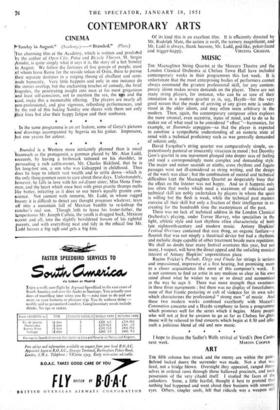MUSIC
THE Macnaghten String Quartet at the Mercury Theatre and the London Classical Orchestra at Chelsea Town Hall have included contemporary works in their programmes this last week. It is unfortunate that the most enterprising bodies of performers cannot always command the greatest professional skill, for any contem- porary idiom makes severe demands on the player. There are not many string players, for instance, who can be as sure of their intonation in a modern quartet as in, say, Haydn—for the very good reason that the mode of arriving at any given note is under- stood in the older idiom, and may often seem arbitrary in the modern. Then, again, the contemporary composer often explores the more unusual, even eccentric, states of mind, and to do so he makes use of what used to be considered "effect "—harmonics, for example, or flautando arpeggios—so that the player is expected to combine a sympathetic understanding of an esoteric state of mind with a technical proficiency such as was generally demanded of soloists only.
David Farquhar's string quartet was comparatively simple, un- pretentiously pastoral or innocently vivacious in mood ; but Dorothy Gow's quartet in one movement plunged into deeper seas of feeling and used a correspondingly more complex and demanding style. The major and minor seconds or ninths, cross rhythms and fugato passages were not ill-considered as string writing, and the design of the work was clear • but the combination of mental and technical difficulties kept the Macnaghten Quartet so desperately busy that the effect on the listener was not happy. And so it happens only too often that works which need a maximum of rehearsal and technical skill are nobly undertaken by players in whom the spirit is willing but the flesh is weak, while the technical past masters exercise all their skill but only a fraction of their intelligence in re- creating for the hundredth time the masterpieces of the past.
There was no lack of technical address in the London Classical Orchestra's playing, under Trevor Harvey, who specialises in the light, athletic style and taut rhythms often characteristic of both late eighteenth-century and modern music. Antony Hopkins' Festival Overture contained that rare thing, an organic fanfare—a flourish that was not simply a theatrical device but had a rhythmic and melodic shape capable of other treatment beside mere repetition. We shall no doubt hear many festival overtures this year, but not many, I suspect, will have the direct appeal and the unfailing musical interest of Antony Hopkins' unpretentious piece. Racine Fricker's Prelude, Elegy and Finale for strings is serious and impassioned, impressive at a first hearing, but promising more to a closer acquaintance like most of this composer's work. It is not common to find an artist in any medium so clear in his own mind about what he wishes to say or so direct and economical in the way he says it. There was more strength than sweetness in these three movements ; but there was no display of forcefulness. none of that frantic posturing or cult of violence for its own sake which characterises the professional " strong men " of music And these two modern works combined excellently with Mozart's Coronation concerto and a Haydn symphony to form a programme which promises well for the series which it begins. Many people who will not at first be anxious to go as far as Chelsea for ilheir music will be relieved to find concerts which begin at 8.30 and nffer such a judiCious blend of old and new music.
a * * a
I hope to discuss the Sadler's Wells revival of Verdi's Don Carlig


































 Previous page
Previous page